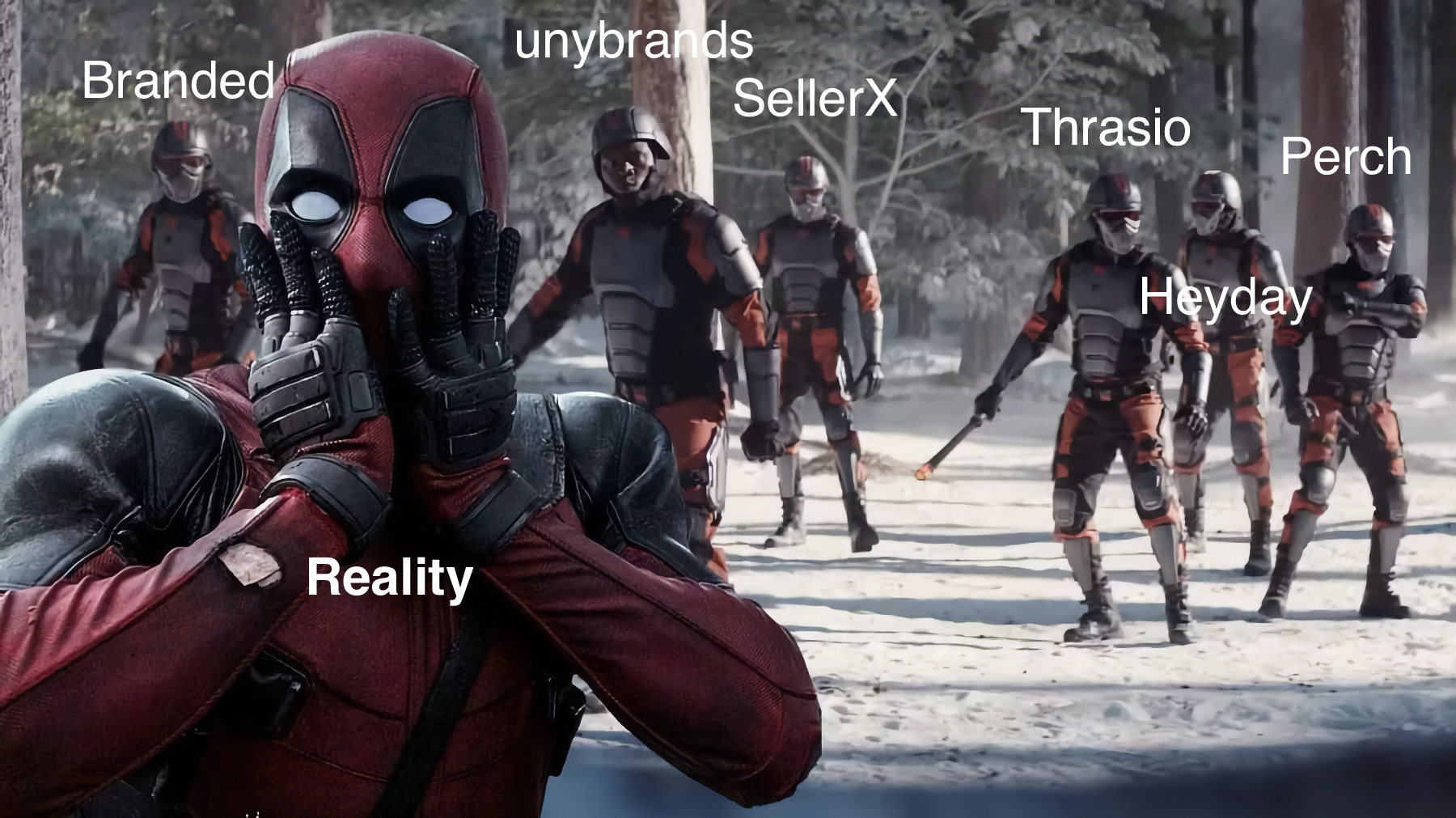That's not how regenerative healing factors work!

Just over a month ago I likened the e-commerce aggregation industry to little more than a pile of garbage. This week Bloomberg and CNBC posted new stories that illustrated how accurate that analogy is – along with evidence the hunt for "a greater fool" continues unabated:
- Amazon aggregators Branded and Heyday plan to merge as once-booming industry continues to shrink
- BlackRock to Auction Amazon Aggregator Once Valued at $1 Billion
- Apollo, BlackRock in Talks to Help Amazon Aggregators Merge
Branded and Heyday
The merger of Branded and Heyday (into "Essor") will bring together two companies that use to brag about their "prowess" in rolling up small Amazon e-commerce brands. On paper they are "expected to generate annual revenue of $400 million" and supposedly be valued at "over a billion". Given the prior two years of history, a valuation north of $1 billion for an aggregator with just $400M in revenue is what Deadpool called "an educated wish" in his latest (excellent) movie.
The math in the e-commerce aggregation industry is pretty simple: valuation is generally 3 - 6x EBITDA. Given the macro-economic environment driving all the bankruptcies and mergers of aggregators (i.e., to avoid bankruptcy), at best "Essor" is likely achieving a 20% margin at the brand-level – that would value them at $480M if you are insane, $240M if you are sane, and $0 if you are realistic. Why $0? Because the "dirty little secret" of the aggregators is that once you factor in the debt payments and the operational costs of running the e-commerce brands acquired – whatever margin they achieve at the brand-level is wiped out at the top-level parent legal entity where they "warehouse" their losses. e.g., see the unybrands UK Companies Houses public filing from 2022 – which was filed before the e-commerce aggregator industry drove itself off a cliff. Or at least before the entire industry realized gravity is a thing.
So, a claimed valuation of "over a billion" for Essor is nothing more than an "educated wish". We've already seen a wave of bankruptcies in the industry and another wave of mergers, which I think is an attempt to starve off the inevitable bankruptcy in the hope of outrunning reality long enough to find new gullible "bag holders".

If you want to see what I mean, just feast on this quote straight from Bloomberg...
Apollo in 2021 committed to invest up to $500 million in senior secured credit facilities originated by Victory Park Capital, which has bet on multiple aggregators. BlackRock also made loans to Amazon aggregators, some of which the firm recently moved to non-accrual status, as borrowers began failing to make payments.
...which is right below this paragraph:
The newly formed company will use a new round of debt to buy promising online brands and try to boost their sales and exposure by getting them into big-box retailers, the people said. More than 80% of consumer spending occurs in physical stores, according to EMarketer Inc., making shelf placement a promising strategy to boost sales of brands that began online.
I suppose like Blind Al what Essor really needs is another hit of "Bolivian marching powder" or was that "White Girl, Interrupted?"
Besides the new round of debt, the comment about "big-box retailers" caught my eye for one very important reason: at the root of all the problems facing the e-commerce aggregation industry are two primary causes. These are 1) too much debt preventing the aggregators from properly investing in the brands they purchase and building the right technology (whether they can build any technology is a post for another time); and 2) an inability to competently operate the e-commerce brands. If you have not mastered one challenging skill (online retail), it seems unwise to take on an entirely new equally difficult skill (physical retail) when you're not doing great.
Of course while the people who drove the car off the cliff prepare their parachutes, its the line-and-file employees that will pay the price:
In connection with the merger, Heyday is expected to conduct a massive round of layoffs that could result in up to 70% of employees losing their jobs, according to a person familiar with the matter who asked not to be named because the cuts haven’t been announced.
SellerX
You do not need glasses... it is true the very same Blackrock that is behind Essor and that "made loans to Amazon aggregators, some of which the firm recently moved to non-accrual status, as borrowers began failing to make payments" was also behind SellerX. One of the interesting aspects of the e-commerce aggregator bubble is how many Wall Street pirates were keeping themselves busy aboard multiple ships (i.e., aggregators)! There was a significant concentration of risk because lenders and investors double and triple dipped into multiple e-commerce aggregators during the bubble. To everyone's surprise except reality:
An advertisement published Friday in the Börsen-Zeitung newspaper stated that the auction for the L Catterton-backed firm has been scheduled for Sept. 17 at a Berlin hotel. In Germany, such auctions can be used by creditors to seize control of companies after negotiations between an enterprise, investors and lenders have hit an impasse, often wiping out equity held by investors.
If you are worried if the co-founders and senior leaders are "doing ok", you can relax because the co-founders of SellerX parachuted onto a $14.2M boat and sailed away in June 2024.
CEOs depart aggregator unicorn SellerX – after taking at least $14m off the table
As you can imagine, once again it was and is the "line-and-file" employees who didn't get a parachute themselves:
A few months after the founders sold their shares, in early 2022, the company made the first of several rounds of layoffs. There were further layoffs in the summer of 2022 and again in the summer of 2023.
I suspect SellerX will not be long for this world.

What happened? One of the two primary causes I mentioned above: too much debt.
BlackRock and Victory Park Capital extended a $400 million loan to SellerX in 2021, which was increased last year when SellerX acquired fellow aggregator Elevate Brands. BlackRock has since moved the loan to nonaccrual status — which means borrowers have stopped making payments.
It was common for the e-commerce aggregators to over leverage themselves 80% or more in debt to pay for the acquisition of e-commerce brands.
Where do we go from here?
The bloodletting in the e-commerce aggregator space is far from finished. If you are an investor, I would steer clear of any and all e-commerce aggregators for the next 2-3 years until the dust settles. I think the business model can work but not when its run by Wall Street clowns and people with zero experience and understanding of e-commerce.
If you an e-commerce brand, I would be extremely careful in selling to any e-commerce aggregator and I would structure any deal as 100% "cash and bye bye". No "residuals" and definitely no stock in the aggregator itself. If you want specific and direct feedback about individual e-commerce aggregators, you can contact me directly. I have direct, hands-on experience in this industry.
Epilogue
Of course I wrote this post listening to N'Sync - "Bye Bye Bye" because there is no greater opening sequence in the history of the Marvel Cinematic Universe (MCU) than Deadpool & Wolverine. The lyrics are supremely appropriate for the entire e-commerce aggregator industry!
And I have to admit I've been very tempted to rename Pinky to "Mr. Paradox" given the hilariously correct cultural background, similar mannerisms and equal level of competence... but I will resist 😃.



